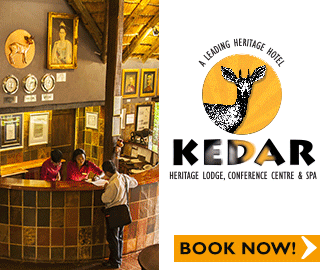Swaziland Tourism Authority to showcase the Kingdom’s gems at World Travel Market Africa
BY BRUCE GERMAINE 10 APR, 2015 13:14
Swaziland Tourism Authority (STA) is set to take centre stage at Africa’s largest B2B inbound and outbound travel showcase, WTM® Africa 2015, next week in Cape Town at the Cape Town International Convention Centre (CTICC). As momentum and excitement around WTM® Africa is swiftly building, STA is preparing to showcase all that the majestic Kingdom of Swaziland has to offer to both inbound and outbound travel professionals.
Swaziland Tourism Authority Account Manager, Chantal Nieuwenhuizen, invites all travel and tourism industry partners, as well as media, to attend this prestigious exhibition to find out first-hand what the Kingdom of Swaziland has to offer. “WTM® Africa is a wonderful platform to showcase Swaziland to the world and we are looking forward to being part of the travel magic created on African soil,” says Nieuwenhuizen.
The Swaziland Tourism Authority will be hosting a media and trade briefing at 14h30on Thursday, 16th April at the Press Conference Theatre on the WTM Africa show floor. Interested parties can confirm their attendance with Este ateste@swazilandtourism.co.za

Ethiopia Set to Expand Airports
BY KRISTIE OMAR 6 APR, 2015 02:33
Ethiopia is set to expand its airport reach with construction of three airport runways in three major regional cites, with a capacity to host big jets like B737.
The Ethiopian Airports Enterprise (EAE) the state company tasked with expanding and supervising Ethiopia’s increasing airports signed a $68.5 million (1.37 billion Ethiopian Birr) with three local firms who won tenders for the construction of three airport runways, on December 11, 2014.
The Runways which will each have 2,500 meters length and 60 meters width, are part of the government’s drive to boost trade and tourism ties across the country for it’s next ambitious economic goal named Growth and Transformation Plan II (GTP) set to start in end of 2015.
The most anticipated contract was the one for the southern city Hawassa, Ethiopia’s premier resort and tourism Hotspot as well as an industrial hub with a total cost $ 22.9 million. The contracting company is named Yotek Construction private Limited Company (PLC) with the supervisory form being Saba Engineering (Plc).
The second contract pertains to runway construction for another southern city Robe Goba, won by Akir Construction PlC for $ 24.7 million and to be supervised by Transport Construction Design Plc.
Robe is better known for its proximity to the UNESCO listed natural wonder the Sof Omer Cave system, and for being an agricultural belt of Ethiopia.
With The third project being in the Far North of the country near the city of Shire, to be constructed by Ethiopian Roads Construction Corporation (ERCC) and supervised by Transport Construction Design Plc at a cost $ 20.9 million.
The Third project hopes to utilize the mineral resources of the area especially gold which in that part of the country is heavily dominated by Artisanal mining.
Tewodros Dawit Head of EAE stated at the signing ceremony the projects will have a duration period of two years and to be followed later on with the construction of their respective airport terminals.
“In preparation for GTP II we plan to also start construction of runway and terminal for the capital of Afar region Semera known as being a get way to landlocked Ethiopia’s major sea outlet the Djibouti port” he stated adding that this north eastern part of Ethiopia is also known for it’s huge deposits of Potash and other minerals, as well as touristic volcanic areas.
EAE administers dozens of airports and airstrips around the country, including four international Grade, the Addis Ababa Bole, Bahir Dar, Mekelle International Airport and Dire Dawa International Airports.


Lesotho declares itself open for tourists
BY TIDIMALO SHABALALA 15 MAY, 2015 06:06
Lesotho, has announced that the country is to go into high gear in a drive to attract more tourists to the country. At the heart of their goals will be efforts to improve facilities, boost the contribution that tourism makes to the national economy and increase job creation within the tourism and associated business sectors.
With 2.5% of the national GDP derived from tourism, there is massive potential for the country to grow the contribution of tourism to the economy and make Lesotho a ‘go to’ destination, says Mr Mpaiphele Dyson Maqutu, the CEO of Lesotho Tourism Development Corporation (LTDC).
Tourism has the potential to increase employment opportunities for Basotho’s. After mining and textile manufacturing, tourism is the next highest employment generator in the country.
“It was the realisation that there were real, untapped opportunities for job creation and even infrastructural growth that could be driven by tourism, which galvanised government. The challenge is to develop a sector which presently derives 15% of its income from the sales of food, beverages and 63% from the provision of accommodation,” says Mr Maqutu.
It is in the accommodation sector-spread over a range of hotels, guest houses and B&B’s that LTDC has begun focusing its efforts to formalise tourism offerings and make them more appealing to tourists.
“We have developed and are implementing a star grading system that will bring uniformity and upgrade the quality of accommodation establishments. This will ensure that international tourists can visit the country secure in the knowledge that they can expect quality, graded accommodation that continues to meet international standards”.
“Although registration is presently being conducted on a voluntary basis, those taking part in the programme have already indicated that they are seeing an increase in ‘bed nights’ following registration. The final objective is to fully regulate accommodation and the grading system. However, we expect the passion of those who are seeing the results to drive increased voluntary adoption of the standards”.
“The most encouraging statistic that will assist the grading process and other plans is the fact that 85% of people already in the industry participate on a full-time basis. Of those working full time in the sector, about 97% are local and most are between the ages of 18 and 40 - an encouraging statistic, as this is the most vital employment period in most people’s lives. So, there is not only room for growth, but also the promise of a sustainable way of earning an income for those wishing to work in the industry.”
Mr Maqutu also added that “Training is of vital concern and is top of the agenda as it will be vital in ensuring the overall quality of the tourist experience. Some of the people presently engaged in tourism are in the sector by default, because they have facilities available. We need to engender a passion for the industry within these people-training is obviously the key.”
The initial focus for LTDC will be to persuade the 1 000 000 South Africans who presently visit Lesotho for business or pleasure every year to extend their stay and take advantage of Lesotho’s many attractions. Key international markets such as Germany, Netherlands will continue to be addressed aggressively through direct promotions, efforts that have reaped results in the past. LTDC will also continue to target other regions in Africa and Internationally.



Calabar ICC Joins ICCA as First Member from the West and Central African Region
BY REBECCA BAM 08 JUN, 2015 12:04
The Calabar International Convention Centre [Calabar ICC] continued to register unprecedented milestones in the international meetings industry when the ICCA board, sitting at the Headquarters in Amsterdam, Netherlands, formally approved the application of Calabar ICC to join ICCA.
ICCA – is the International Congress and Convention Association, one of the most prestigious organisations in the world of the international meetings industry. It is the only global association that comprises a membership representing the main specialists in organising, transporting, and accommodating international meetings and events, and comprises almost 1,000 member companies and organisations in over 90 countries worldwide.
On receiving the communication from the ICCA President, Ben Asoro, Director of Marketing and Sales commented, “I am glad and grateful that we have achieved this. Joining ICCA puts Calabar ICC on a global platform with valuable resources, in the bidding cycle, to help us effectively compete, bid for, and win more international conferences to be hosted in Calabar, Nigeria.”
Calabar ICC is poised to be one of the leading convention facilities in Africa and couldn’t have joined ICCA at a more appropriate time than now. Calabar ICC is ICCA’s first member from the west and central African region.
Applauding the development, Paul D’Arcy, the Calabar ICC CEO, said “it is a pleasure to be part of the ICCA family once again. The benefits which membership of ICCA brings to an international conference centre are immense. The collective knowledge of ICCA, which becomes available to all member organisations, leads to a significant competitive advantage.”
The Calabar ICC is part of the remarkable 367 hectare Summit Hills development that will include a business hotel, international hospital, 18-hole golf course and a residential development. A scenic monorail will convey delegates across the Tinapa Lake between the Calabar ICC and the Tinapa Lakeside Hotel. For more information on Calabar International Convention Centre, contact: +234 (0) 811 056 0617, or info@conventioncentrecalabar.com

New R 887 million Sani Pass road will boost tourist traffic between South Africa and Lesotho
BY TIDIMALO SHABALALA 25 JUN, 2015 07:43
The 33 kilometre trip up the Sani Pass to the highest pub in Africa and onwards into the ‘mountain kingdom’ will become more accessible and act as a magnet to boost visitor numbers when the job of laying asphalt on the twisting gravel surface that links South Africa and Lesotho is completed.
Announced in 2014, the laying of an asphalt surface at an estimated cost of R 887 million is already well underway, but it will be some time before the project is completed and provides a more ‘driveable’ link between KwaZulu Natal and Lesotho, says Mpaiphele Maqutu , Chief Executive Officer at the Lesotho Tourism Development Corporation, who adds that estimated completion date for the project is 2016.
“Once completed, the road will act as an attraction to a broader base of tourists and bring new prosperity and economic development to the kingdom.
“This project will bring to life what was envisaged when the South African and Lesotho governments agreed that tarring the road made sense-both from an environmental and economic viewpoint. A gravel road deteriorates and is degraded by traffic and constantly changing weather. Grading to repair the surface has to take place on a regular basis. This over the years has placed constraints on the free-flow of people between the two countries and the economic prosperity of Lesotho-something that is beneficial to both countries.”
From a tourist viewpoint, says Maqutu, it is doubtful whether the improvement of the surface will lead to a decline in tourist traffic as has been claimed in some circles. He points out that the road, full of hairpin bends that wind in on themselves, will still remain a challenge to motorists who get a thrill from driving up the pass.
“We have no doubt that increasing numbers of tourists will take to the road. All that will change, however, will be the fact that instead of just having a drink at the pub at the road’s summit, more will be encouraged to drive into Lesotho and experience the unique beauty of Africa’s highest kingdom.
“This improved access will bring Afriski, Africa’s biggest snow-ski resort, closer and enable enthusiasts – who previously entered Lesotho through the Free State to enjoy the Sani Passand proceed with ease to the Afriski Mountain resort.
“At Lesotho Tourism Development Corporation, we believe that the development will encourage more visitors to enjoy our land of mountains and discover more about the country whose entire area lies at an altitude that ranges between 3,482 and - 1 400 metres above sea level.
“Access via Sani Pass will, we believe, also encourage rather than discourage adventure tourists. The drive up the pass will be easier, but the new road will also bring closer features such as theThabana-Ntlenyana mountain- at 3 482m, the highest plateau in Southern Africa; the 192 metre single waterfall drop of Maletsunyane is 192m with the world’s highest abseiling cliff. At 204 metres, this edifice presents a challenge that few adventure tourists will want to miss.
“Making all this more accessible to visitors simply makes sense.”
The tarring of the Sani Pass road is also a major step forward in encouraging South Africans and international touriststo make Lesotho a destination of choice-a formal programme that was recently launched in the country and is steadily gathering momentum.
“Opening the likes of Letseng diamond mine area which boasts the world’s finest carat rated diamonds to tourism through the Sani road development will mean bringing the benefits of sustainable jobs and economic development to this area.
“Adding more tourist accommodation and conference facilities in Maseru, another major focus, will also add momentum to the drive of increasing Lesotho’s status as an African tourist destination in its own right,” says Mr Maqutu.



CEO of Lesotho Tourism Development Corporation - Mpaiphele Maqutu
Jayshree Naidoo, Standard Banks Incubator Head
Standard Bank unveils two incubator accelerator programmes
BY THEMBA MSIMANGO 10 JUL, 2015 13:03
As part of Standard Banks commitment to developing entrepreneurs and ensuring the sustainability of their businesses, the bank has added two accelerator programmes, SW7 Tech Accelerator and Ignitor Bootcamp to its business incubator in Rosebank - both dedicated to equipping SMEs with practical tools, knowledge, advice and skills that are essential for their growth.
Both initiatives provide businessmen and women with access to networks, markets, respected mentors and technical applications, but SW7 is focused on companies with established products and client bases, while Ignitor is geared towards start-ups.
Jayshree Naidoo, Standard Banks Incubator Head, says the addition of these accelerator programmes to the business incubator in Rosebank, follows the recent launch (16 April) of Standard Bank’s two incubators in Johannesburg, virtual incubators in Cape Town, Free State, Limpopo, and KwaZulu-Natal, all aimed at educating, creating, empowering and developing entrepreneurs in South Africa.
“With the addition of SW7 and Ignitor, Standard Bank further demonstrates its commitment to serving SMEs by providing them with practical solutions for dealing with daily challenges, thus proving its dedication to bringing innovative solutions to market,” says Ms Naidoo.
“To become a world class economy, entrepreneurship must form the basis of our country’s formal industry to stimulate job creation and thus economic and social development. Very often, entrepreneurs approach organisations like Standard Bank for funding, but to become successful, they really need access to technical and development resources. This is where SW7 and Ignitor come in.”
The accelerator programmes
Standard Bank partnered with the largest mentor-led tech innovator in Africa, Start with 7, founded by Odette and Keith Jones, and Paul Smith and Justin Coetsee of Ignitor, a startup acceleration programme.
“SW7 is not just about the structure and concepts you need to launch and run a business,” says Mr Jones. “It is actually about using our contacts and networks to get businesses to market – which, in this case, are large corporates – and showing them what to do once they get there. We’re also about connecting the smart people in South Africa, leading to more business being done more effectively.”
On the other hand, the goal of Ignitor is to help entrepreneurs create a better world from an economic contribution point of view, according to cofounder Paul Smith.
“Entrepreneurs have a profound impact on social development, particularly tech entrepreneurs,” says Mr Smith. “For this reason, we want to take them from the idea stage and help them create profitable, growing businesses. To do this, we expose them to Lean StartUp, a scientific method to build and manage startups, and then get products to targeted consumers as fast as possible with as little risk as possible. The second thing is to introduce them to the right mentors.”
Just like SW7, Ignitor uses practical workshops, peer collaboration and coaching from other successful entrepreneurs to inspire programme attendees.
“The people who mentor for us have developed their own tech product businesses. No consultants, no academics – you have to have done it before,” says Mr Jones.
Views from entrepreneurs
While most entrepreneurs say they are looking for business development support and access to markets, Rudzani Matshatshe, founder of One Cloud Internet, a company that brings affordable, high-speed internet to homes and businesses in Gauteng using fibre optics, says “If we can have exposure to and network with businesses - that would absolutely help us greatly.”
His partner, Warren Dickerson, agrees, “Networking and learning from other SMEs would be a huge advantage to us.”
Ms Naidoo says though Standard Bank and its partners aim to help entrepreneurs find success and prosperity through the business incubation system, ultimately that is not their only objective.
“Countries with a high number of small businesses report strong increases in job opportunities, technological and research development and, of course, economic growth. All this has direct and indirect positive consequences on other industries and living conditions - so supporting, cultivating and forming working relationships with SMEs aligns with the bank’s - and the nation’s - goal to keep South Africa competitive on a global scale.”
“Standard Bank is passionate about being the bank for entrepreneurs. We see Africa as our home and we are keen to make a difference to South Africa. By growing entrepreneurs, we know it will have a direct impact on job creation, social and economic upliftment and our country’s effectiveness on the international stage,” concludes Ms Naidoo.










